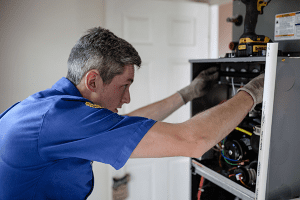You probably have a smoke detector in your Dayton home, especially since most new homes come with them already installed. Most people would agree that it is a “no-brainer” to have one in your home to alert you and your family of a possible fire. But, what about a carbon monoxide (CO) detector? Do you have any installed in your home?
What Makes A Carbon Monoxide Detector A No-Brainer?
 Colorless, Odorless and Deadly
Colorless, Odorless and Deadly
The importance of having a CO detector is often underestimated. There are many common factors that are in our everyday homes that could put you and your family at risk of carbon monoxide poisoning. For example, oil and gas furnaces, generators, motor vehicles, stove/gas range, gas line leaks, gas water heaters, and even space heaters are just a few to name. It has been reported that over 15,000 people each year are treated in emergency rooms for non-fire related carbon monoxide exposures and an average of 500 people die each year from the same thing.
What Exactly Is Carbon Monoxide?
Carbon Monoxide (CO) is a deadly, odorless, tasteless, and colorless gas. It is often referred to as, “The Silent Killer” and is very easy for this deadly gas to build up in your home without you even knowing. It is the leading cause of poisonous deaths. It forms when there is not enough oxygen to produce carbon dioxide (CO2), such as when operating a stove or an internal combustion engine in an enclosed space.
Where Do CO Detectors Belong?
If you have any appliances that burn natural or liquefied petroleum gas, oil, wood, coal, or other fuels, or if your home has an attached garage, it would be a smart idea to have a CO detector in your home. To help you avoid exposing your home to carbon monoxide, you should have your appliances (heating systems, water heater, etc.) serviced by one of our clean, screened, trained, and timely CJS technicians every year.
Install a battery-operated carbon monoxide (CO) detector in your home and be sure to check or replace the batteries, preferably when you change the time on your clocks each spring and fall. Also be sure that your detector is not blocked by furniture or draperies. If your carbon monoxide (CO) detector sounds, evacuate your home immediately and call 911.
You should never use a generator, charcoal grill, camp stove, or other gasoline or charcoal-burning device in your home, basement, or garage. Do not run a vehicle inside a garage attached to your home, even if the garage door is open. You should also never heat your home with a gas oven, or burn anything in a stove or fireplace that is not properly vented.
Carbon Monoxide Warning Signs
If you are feeling any of the following or you suspect CO poisoning, seek medical help right away. These may be signs of carbon monoxide poisoning and could cause death.
- Dizziness
- Light headed
- Nauseated
- Vomiting
- Weakness
- Loss of consciousness
- Shortness of breath
- Sleepiness
- Loss of muscle control
- Chest tightness
- Confusion
- Blurred vision
The Life You Save May Be Your Own
If you do not have a carbon monoxide (CO) detector in your home already, you can go to any local retail store and pick one up. They usually range in prices starting around $15+. Remember to change or check your batteries regularly, and know what to look for when dealing with a possible carbon monoxide (CO) poisoning.
